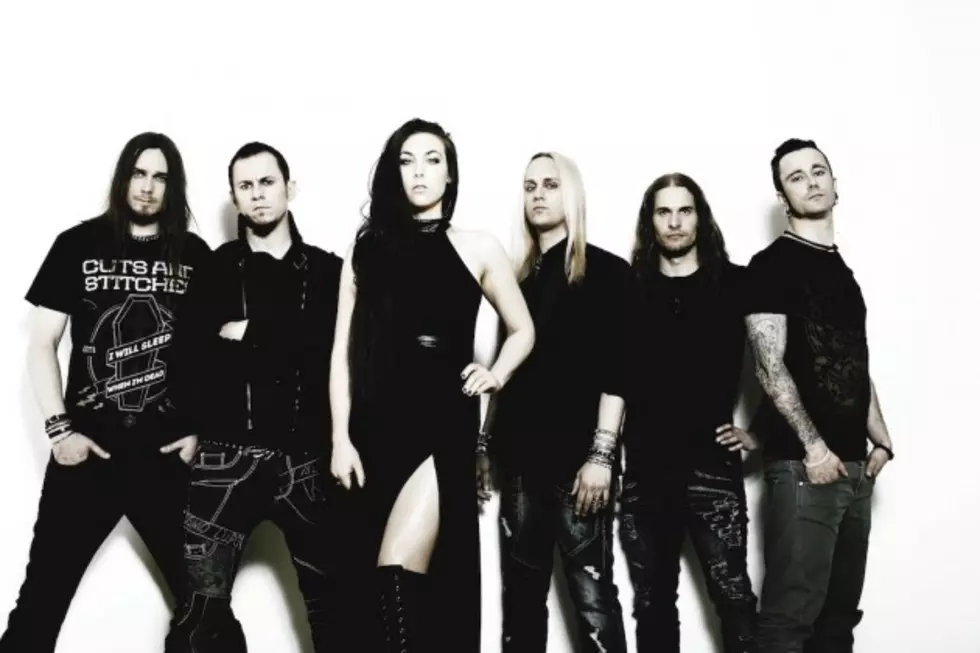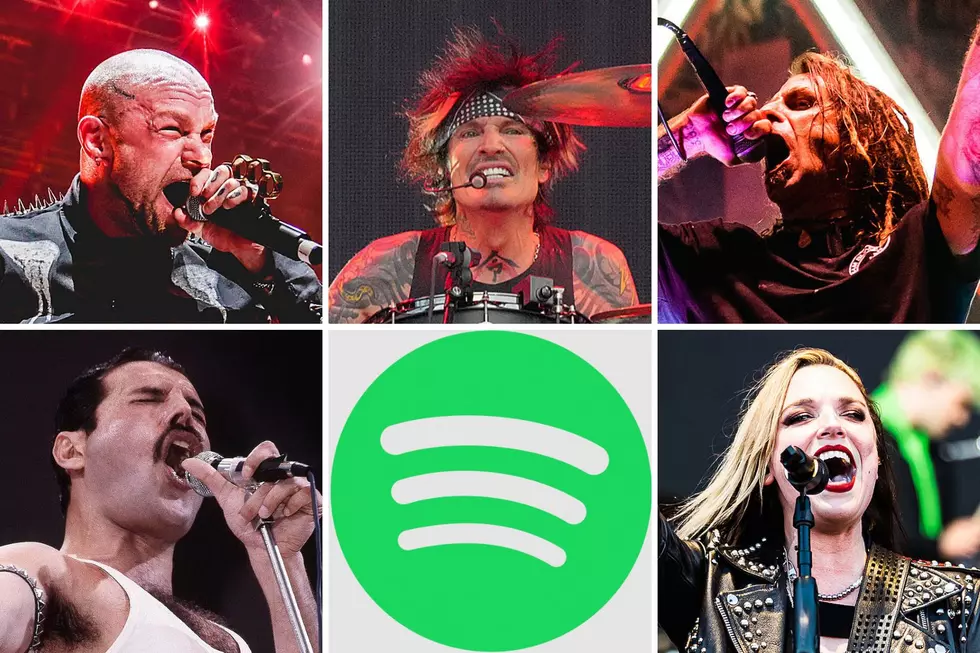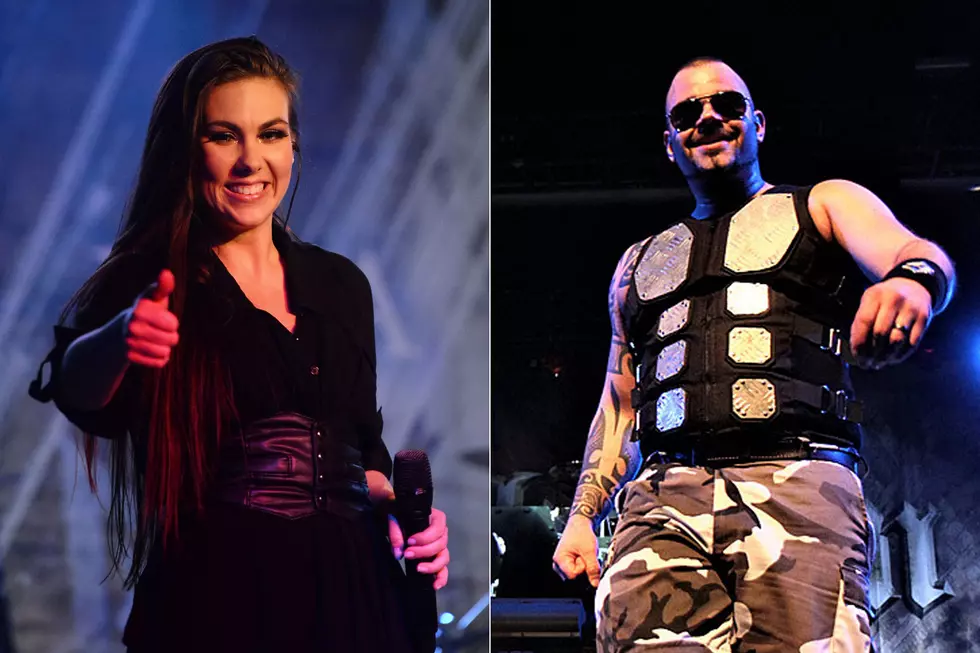
Amaranthe Talk ‘Massive Addictive’ + Debate Merits of the Term ‘Female-Fronted’
We recently had Amaranthe singer Elize Ryd, vocalist Jake E and guitarist / keyboardist Olof Mörck drop by our offices for an interview.
During our chat with the trio, we spoke about Amaranthe's newest album, Massive Addictive, and the combination of influences they all bring to the band. We also delved into the term "female-fronted" when it comes to metal music and whether or not the phrase should be thrashed altogether.
Check out this fascinating chat with Elize, Jake and Olof of Amaranthe!
I've been listening to Massive Addictive, trying to think of how it compares to your other records. The flow of this one started off more electronic and then waved down a bit. How would you describe the flow of the record?
Olof Mörck: I think we wanted something that was, I want to say simpler and absolutely not more easily digestible, but something that was a lot more direct somehow. Because I think that with the earlier records that we've written, there's been a lot of really interesting progressive stuff in the musical department, which we really love, but sometimes it can get in the way of the song. And sometimes it can be a great part of the song; it really depends. At the end of the day, the way we see it, a really great song is a really great chorus, a really big riff and a really good verse and a really good build up to the chorus. And of course you can embellish it and add as many ornaments as you want, but at the end of the day it's all about the songs.
I think the general flow of the album is a lot closer to the perspective of the songwriting more than Morten needs to show off his bass drum, or I need to play a lot of guitar solos all over the place. As it gets towards the end of the album, it kind of picks up a little more of the progressive stuff, so it's still there. I think in general, if you have a song like "Drop Dead Cynical," talking about flow, it has a flow because it never breaks the flow, never breaks the pace.
It's interesting that you're bringing up choruses, because bands who have power metal dynamics; it seems like everything is going towards the chorus and the chorus has to be huge and it has to be the central focus of the song. Is that something you focus on, maybe more than other parts?
Jake E: For me personally, I have a hard time listening to music that does not have a hook. It does not specifically have to be the chorus, but you want to have something that sticks to your brain and usually that is the chorus and something you can sing along with. One thing that is really cool is that the "Drop Dead Cynical" song, the hook is more in the guitar riff than it actually is in the chorus. When we write songs we always have the chorus in mind. We sometimes throw away songs because we are not satisfied with the chorus.
Elize Ryd: When I write personally, I write the chorus and when we work together or just start to write, we usually want to start with the chorus, and then we realize that that should be the verse and then there should be the chorus. We just take parts from the melody. In a good song, the verse should also be as good as the chorus. It's actually very funny; I think about it often. You should always focus on making a good chorus and that turns also into making a very nice verse, or you have to take down the verse. For "Drop Dead Cynical," I thought it should be something that should be a little more laid back in attitude because that makes the chorus sound bigger in comparison.
Olof: It's a science to get the balance absolutely right.
I'm interested in Swedish and Danish radio. You don't even get rock anymore here. Is Amaranthe something that is accessible to Swedish or Danish radio?
Jake: Where we're played, on a lot of rock stations, they are way smaller. We are not being played on the radio very often where Justin Bieber or Madonna is being played. It's inaccessible. In Denmark, we're nothing. We've played two shows in Denmark over the years, even though Morten is from there. Our market would be more to Sweden and Finland instead of Denmark, actually.
Olof: Sweden and Finland are similar in that sense. Let's say you have six or seven really big radio stations and all of them are completely nationwide. It's not like in Gothenburg they play this music and then in Stockholm they play something else. If they're going to play it on the rock or pop radio stations in Sweden, it's simultaneously played all over the country. So you have six or seven really big stations and one of the biggest ones is a rock station and they play the s--t out of us all the time. That's a really powerful thing and that doesn't really happen that much in America, but at the same time you have stuff like Octane and Liquid Metal which is still pretty damn huge. So when people are saying it doesn't get played on normal radio, you guys don't even have any nationwide stations. If you get into the two biggest radio stations in Sweden, then you have made it all over the country. In the U.S., it's difficult because you could be huge in California as a pop or rap artist on mainstream radio but people in New York won't even know about it because it's different music being played all over the country.
Massive Addictive is your highest charting record to date in the States, which is always exciting. Have you seen that change when it comes to playing shows here?
Elize: Oh yeah, I'd say so.
Yeah? It's gotten much bigger?
Olof: Yeah, the pre-sales are looking great so far. It's hard to say because the last time we were here, the album was really new. But even at that point you could pick up that something was going on. Speaking of radio, I think the big difference is that we're being pushed at radio, which has helped album sales as well. It's gonna be a real interesting thing to see the consequence of that with the tour starting.
You touch a lot of different groups of metal fans in a lot of different ways. If you go to festivals that are based on one certain genre, you can easily see a difference between the fan bases. When you're at a show, is it easy to pick out who enjoys certain aspects of Amaranthe?
Jake: We don't like to label our music as something specific. If you say that it's female-fronted metal and Tim says it's power metal or Amy says it's death metal, we don't care. It's music. I couldn't care less if there's a guy in a suit or if there's a guy in jeans with patches on. They're our audience and they're sharing in having a good time.
Elize: It's very easy to judge people by how they look or dress and in general, that's a problem. Even though someone may look like a dude that shouldn't like our music, maybe he does anyways. Or me, for example, maybe you don't know that I like death metal, but I do. I love to see our audience because you can see that there are so many different kinds of people and they all gather. We actually make them connected. It's like ourselves. He's [Olaf] a nerd. I'm the cool chick. [Laughs]
Jake: What was I?
Elize: The Bon Jovi guy. [Laughs] For us, friends connected us with music. That's also one of the things that made me want to focus on this band and really went for it. Because we always talked about this; the music connected us even though we are not from the same group of people. But we found each other though the music and we love it and everybody liked it as much. So we thought, this is a good start, to maybe people realize that you don't have to be a certain type of person to like a certain type of music.
What are your musical backgrounds?
Elize: [Turns to Olof] Your's is probably more classical.
Olof: Exactly. I was growing up in classical music and learned to play music on the violin and piano; also composing. Elize is more from musicals and dancing.
Elize: Nope. I grew up in a hardcore / metal family.
Olof: [Laughs] Okay.
Really?
Elize: Yeah, my brother was a growler in band as long as I can remember. My father listened to KISS and Iron Maiden. My sister listened to jazz and my mom listened to pop and punk. [Laughs] Everybody in the family was always arguing about what kind of music was better. My mom closed my door when I started listening to Beyonce and Destiny's Child in my teens. She was like, slamming the door. She hated it.
It's like rebelling in a weird way.
Elize: Everybody was fighting about music. What was your musical background, Jake?
Jake: I'm the non-classical music fan.
Elize: Oh yeah, he was playing hockey.
Jake: I grew up on old-school metal like Accept, Judas Priest, Iron Maiden… Helloween was one of my favorite bands. I listened to a lot of American bands back then like Riot and Sanctuary, which became Nevermore.
Elize: My biggest idols ever was ABBA. When I found them, I was in heaven. I was 10.
Is it time for "female-fronted" to stop being a big talking point for a band?
Jake: Floor Jansen from Nightwish posted the best statement ever.
Elize: I think it sucked.
Jake: For me, personally, it was a great statement. Why do females have to be put on as female-fronted?
Elize: Duh, because it used to be only men in this and people want to know if it's female-fronted. That's a good thing. You can search for it and find these bands and if we chose not to, then people will not find us if they search for that word. But that doesn't mean it has to be a bad word, which it seems like now Floor Jansen is saying in a negative way. For me, as a female and a singer and one of the front-figures it's a bit annoying. I get the point that it's positive and we should be even...
Jake: Diplomacy wasn't the point. The point was if you call a band female-fronted metal and you say it as a genre, it says nothing about the music at all. Somehow it became a genre because everyone that had a female singer was doing something in symphonic metal. I think where the term "female-fronted metal" started to lose it's relevance was when everyone started to do it in completely different genres. All of a sudden to call something female-fronted metal and talk about it as a genre became very strange. You can talk about Arch Enemy, you can talk about Delain, or Nightwish or us.
Olof: And none of those sound the same. It's like going to the store to buy milk but one package is water and the other is coke, but you call all of them milk.
Jake: It's not really a question of gender. It's a question of misinformation.
Elize: People maybe don't see it as a genre, they see it more of an easy way. 'Female-fronted' -- is there a female singer or not?
Olof: Then you could just say go the easy route; it's power metal with female vocals or death metal with female vocals. You could be describing Arch Enemy, which is completely fine. But to say they belong to the genre of female-fronted metal, it's a term that should be declared dead.
Elize: I don't think anyone has said that though.
Olof: Of course they do, all the time.
Elize: I don't think about symphonic music when I think about female-fronted. I saw Nightwish, Delain and the Marmozets, I love them.
Jake: If you're talking about the Marmozets, you'd be doing them a disservice to call them female-fronted rock or metal. It'd be stupid. I have no idea what they refer themselves to at all.
From the negative side of that, is part of the negativity based on a lot of female-fronted bands using their sexuality and sex appeal to sell the music? Is that part of the negative stereotype, or is it just something that should be gender neutral?
Elize: That's also something that, as a female, I've never seen anyone selling through sex. We have fashion or there are certain type of clothes of people who listen to metal like. They can be leather, tight, whatever, chains. It doesn't even have to be sexy. It can be not-so-good looking, but still people think, 'Oh, she does that just to sell her body or sell her music through looking in a certain way.' That's also a judgement I don't agree with. It's a preconception. So if I wear a dress today, it's not because I want you to look at my awesome legs and think that I'm super hot or something, it's because it's warm outside and I like dresses and they're designed for women. I've had a lot of criticism for my clothes also. It's funny, because I don't even think about it when I put them on, but then when I read the comments, people really that I'm showing off when I'm wearing more clothes than Johan [bass] because he's completely bare.
Olof: If you look at metal bands with female singers, I think it's rare to see any of the women being sexualized. I think the sexualization comes more from the fans.
Elize: Exactly.
Olof: How people are drooling over these ladies on forums. At least if you compare an Arch Enemy video or a Nightwish video to any Shakira or Britney Spears video, if you really want to talk about sexualization in general, then I think the pop genre is 100 times more extreme. Or maybe there are bands who do that. I haven't seen it.
Elize: I haven't seen it either.
Jake: It's actually pretty cool with In This Moment, for example, who are really playing on that whole concept that people are talking about sexualization in metal and saying 'screw it, because we don't do that.' Like the 'Sex Metal Barbie' thing.
Elize: That'd be like if you actually made a porn.
Jake: Like Rammstein! [music video for "P--sy"]
Elize: That's way worse than a girl having cleavage.
Thanks to Amaranthe for the interview! To grab a copy of 'Massive Addictive,' click here.
20 Supreme Metal Goddesses
More From Loudwire









